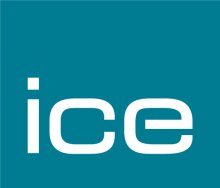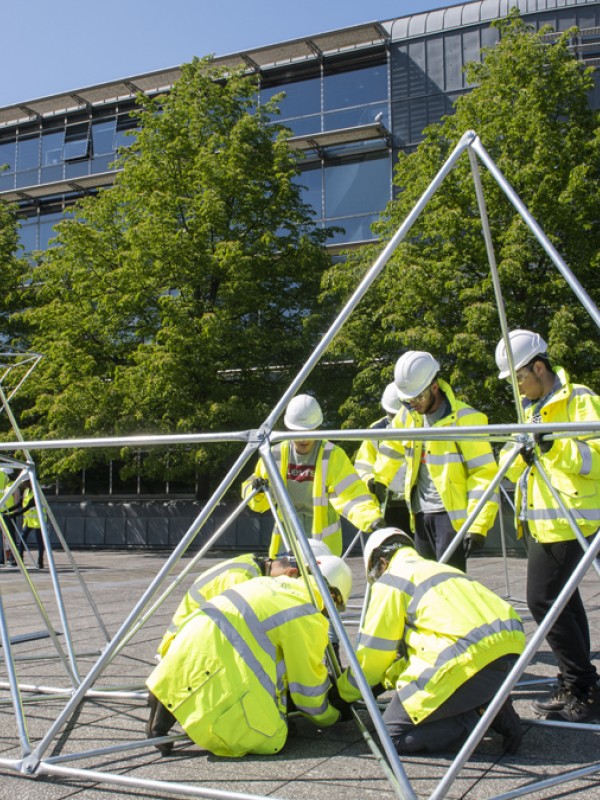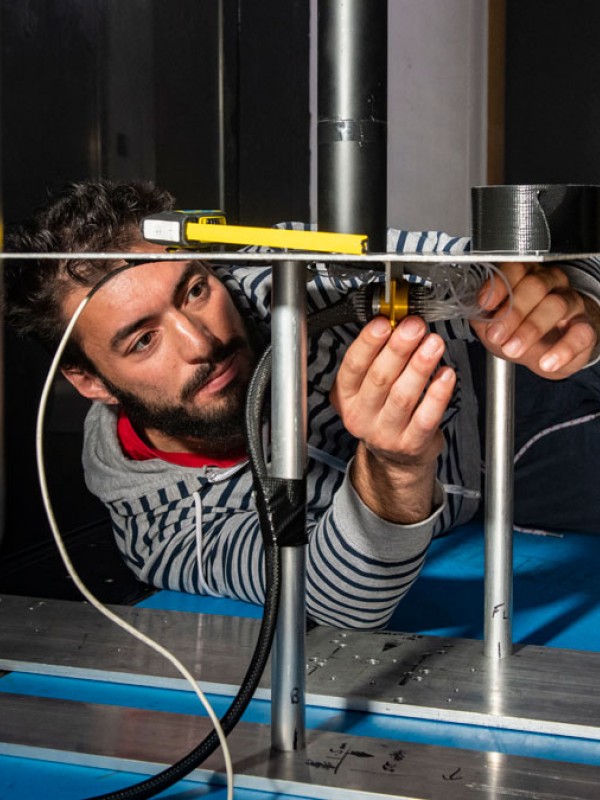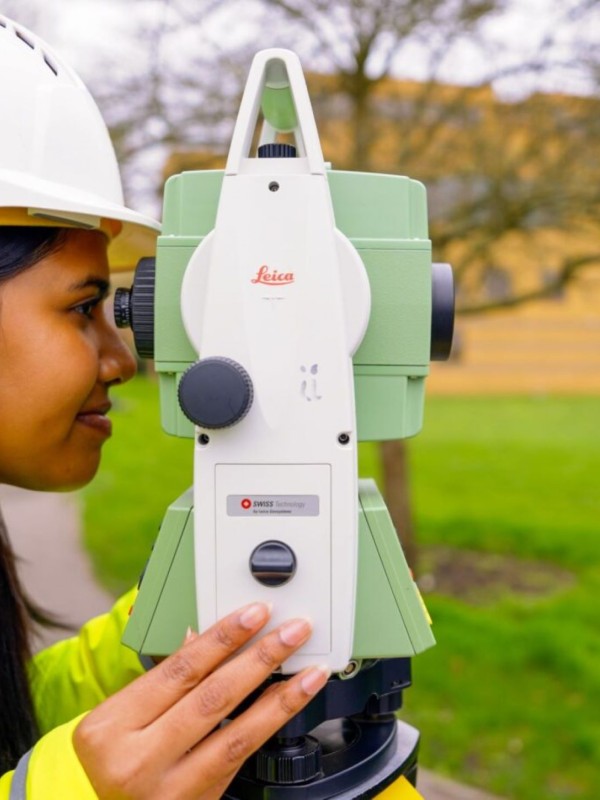
- Structural Engineering
MSc — 2026 entry Structural Engineering
Structural engineers create the 'bones and muscles' of human-made structures. Our Structural Engineering MSc will equip you with advanced knowledge and skills in designing, analysing, and optimising structures to ensure their safety, durability, and sustainability.
4,138+ people have created a bespoke digital prospectus
Why choose
this course?
Running since 1966, our masters in Structural Engineering allows you to choose from a rich and varied selection of specialist structural engineering modules.
You’ll be taught by forward-thinking academics at the top of their field, as well as practising engineers from consultancies, legislative bodies and local authorities. You’ll also benefit from the exceptional facilities we have to offer, such as our Air Quality Lab and Centre for Environmental Health and Engineering.
You'll also have the opportunity to undertake a postgraduate placement year if you choose our placement pathway, allowing you to gain crucial workplace experience. We’ll support you in finding a placement with a company most suited to your career goals.
Accreditation






What you will study
Our well-established and fully accredited masters in structural engineering degree will enable you to develop advanced capabilities in analysis and codified design in the specialised areas of structural engineering, building on the knowledge and skills you’ve acquired from your undergraduate studies.
You’ll be taught by forward-thinking academics at the top of their field, as well as practising engineers from consultancies, legislative bodies and local authorities. You’ll also benefit from our Materials and Structures Laboratory and have the chance to get involved in testing of different types of structural components as part of your dissertation project.
Professional recognition
MSc - European Accreditation of Engineering Programmes (EUR-ACE)
This Programme is accredited by the European Accreditation of Engineering Programmes (EUR-ACE)
MSc - Joint Board of Moderators (JBM)
This degree is accredited by the Joint Board of Moderators (JBM) comprising of the Institution of Civil Engineers, Institution of Structural Engineers, Institute of Highway Engineers, the Chartered Institution of Highways and Transportation and the Permanent Way Institution on behalf of the Engineering Council as meeting the academic requirement for Further Learning for registration as a Chartered Engineer (CEng). To hold accredited qualifications for CEng registration, candidates must also hold a Bachelor (Hons) degree that has been accredited as partially meeting the academic requirement for registration as a Chartered Engineer (CEng) See www.jbm.org.uk for further information.
*It should be noted that candidates completing the MSc who hold an underpinning accredited Bachelor degree accredited for IEng only or a non-accredited bachelor degree will need to apply for an academic assessment to determine whether they will meet the educational base for CEng registration.
Distance learning
Surrey is a pioneer in distance learning-based MSc courses in civil and environmental engineering. This flexible option allows you to study for our distinctive, accredited programme from anywhere in the world, without the need to relocate or give up your existing job.
As a distance learner, you’ll study eight modules and complete a dissertation in your chosen subject (like full-time and part-time students), but you can take up to five years to complete your masters. You’ll be able to access all module materials through our virtual learning environment, SurreyLearn, and arrange to take end-of-module exams remotely.
Learn more about distance learning programmes (PDF).
Facilities
As part of your learning experience, you’ll have at your disposal a wide range of relevant software, including ABAQUS, ANSYS, CRISP, DIANA, Integer SuperSTRESS, LUSAS, MATLAB, PertMaster DRACULA, SAP 2000 and VISSIM.
You’ll also benefit from a range of highly specialised facilities in our School of Sustainability, Civil and Environmental Engineering. These include our:
- Air Quality Lab
- Centre for Environmental Health and Engineering, a designated World Health Organization collaborating centre for water quality and health
- Geotechnics and Geology Laboratory
- Materials and Structures Laboratory
- Surrey Advanced Geotechnical Engineering (SAGE) Lab
- Wind tunnel facilities.
The structure of our programmes follows clear educational aims that are tailored to each programme. These are all outlined in the programme specifications which include further details such as the learning outcomes:
Modules
Modules listed are indicative, reflecting the information available at the time of publication. Modules are subject to teaching availability, student demand and/or class size caps.
The University operates a credit framework for all taught programmes based on a 15-credit tariff, meaning all modules are comprised of multiples of 15 credits.
Course options
Year 1
Semester 1
Compulsory
Modern structural engineers are expected to design structures that are not only safe and stable, but also sustainable and resilient. This module is concerned with the analysis and design of steel and composite construction, focusing on multi-storey buildings. In this module, students develop the skills to evaluate the structural steel design process from the brief to the construction stage, including essential aspects related to structural integrity, sustainability and whole-life performance, constructability and health and safety. To effectively work with design codes, engineers must understand the underpinning fundamentals of steel and composite ultimate state design to Eurocode 3 and Eurocode 4, including global and member stability, analysis and design methods. Fundamental concepts related to the performance-based design of steel structures in the context of extreme loading conditions are also introduced. Moreover, specific analysis and design procedures for cold-formed sections are covered. Ultimately, particular attention is given to the overall design process by placing key sustainability drivers at the centre of the material selection, design and construction thinking.
View full module detailsThe Finite Element Method (FEM) is the most commonly used tool in practice for structural design and analysis of bridges, buildings and other types of structures. In order to carry out a successful FE analysis, a basic knowledge of the theory behind the FEM is required as well as an understanding of the applications to different types of structural elements & analyses. This module covers both of these two aspects which are essential for learning how to perform a FE analysis. There is an expectations that students on this module have prior knowledge of structural engineering to the level of final year BEng.
View full module detailsOptional
Prestressed concrete is the principle method by which concrete is used in bridge. The module concentrates on the principles of analysis and design of both pre- and post-tensioning prestressed concrete. Fundamental design principles are covered, based on the physical concepts of prestressing, the properties and use of materials, the anchorages and splices of tendons, the significance of bond, the degree of prestressing and the losses. Focus is placed on both the preliminary and final design of prestressed bridge superstructures, including the loading, the analysis, the detailing and the construction of prestressed superstructures. Design is in accordance with the current Eurocode 2 standards, but is also complemented with state-of-the-art knowledge. Economy and aesthetics are discussed in the module.
View full module detailsThe module reviews the durability characteristics of the materials used in the construction of modern bridges and engineering structures but focuses on concrete and steel, and their combination as both reinforced and prestressed concrete. The relationship between material behaviour and environment is reviewed and the implications for those tasked with the operation of engineering structures in a changing world is discussed. The various methods for assessing the condition of a structure are explored and linked to the need for viable inspection, maintenance strategies. The course uses a number of case studies to allow the material presented to be placed within its engineering context. The lessons learnt are applied to the problem of the design and construction of new structures in light of the degradation process and external forces to which they may be subject.The module provides students with an opportunity to review and extend their understanding and integration of the key threads of Design, Health and Safety and Sustainability in relation to the whole life of an asset.
View full module detailsInfrastructure systems have become increasingly complex and interconnected which results in strong interdependencies between them. These systems may become fragile and subject to disruptions that can have significant consequences both in the local as well as national and global level. This module forms the foundation required for systems thinking in infrastructure by introducing the background required for modelling the interconnected nature of infrastructure systems and understanding the different types of interdependencies that exist between them. It also provides an overview of the different types of risks that need to be considered for assessing the resilience of infrastructure systems and discusses the different adaptation and mitigation options available for sustaining their continuous operation and preventing cascading failures.
View full module detailsThis module provides an overview of the management of infrastructure assets both at individual as well as network/system level. It introduces the concepts, theory and methods for infrastructure asset management through utilisation of a whole-life framework. It covers asset management frameworks, risk management and asset performance modelling towards the development of maintenance strategies for infrastructure assets. Case study examples from different infrastructure sectors are reviewed.
View full module detailsThis module is designed to provide insights into aspects of advanced soil mechanics, including soil constitutive models, soil parameter selections and determinations, which are necessary to carry out design of geotechnical structures and foundations. It will also introduce the Finite Element Models and its applications to analyse typical soil-structure interaction problems. It builds upon the fundamental knowledge from module ENG2104 Soil Mechanics, thus a revision to the essential basics is given at the start of the module.
View full module detailsENGM270 Energy Geotechnics is a postgraduate module focused on the geotechnical design principles essential for contemporary and emerging energy infrastructure projects. The curriculum encompasses shallow geothermal energy systems, renewable energy foundations for both offshore and onshore wind turbines, offshore oil and gas installation foundations, and nuclear power systems. Specialised lectures cover high-level nuclear waste disposal and carbon geo-sequestration. Key topics include heat transport in soils, geothermal energy pile systems, and offshore wind turbine foundation design, supplemented by practical coursework on numerical modelling of geothermal systems. The module is designed for students with a foundational understanding of soil and structural mechanics, equivalent to a final-year Bachelor of Engineering.
View full module detailsSemester 2
Compulsory
Reinforced concrete design is taught to different levels and to different codes in Universities worldwide and those entering the MSc at the University of Surrey have a variety of backgrounds. The course is based on the Eurocodes and includes the role of the designer in building construction, health and safety and sustainability issues, and challenges students to develop conceptual ideas on a design rather than just delivering a design from a drawing. The module includes the design of simple elements such as beams, slabs, flat slab including punching shear, slender and short column design and shear wall design. This module is for students with knowledge of structural analysis at final year BEng level..
View full module detailsInfrastructure systems play a crucial role towards sustainable development as they serve the needs of the society. An understanding of the three dimensions of sustainability, economic, environmental and social, is vital towards the planning, design and operation of sustainable infrastructure systems. This module evaluative frameworks that can capture economic, environmental and social constraints to understand the balance between these three dimensions towards the development of sustainable infrastructure projects. Particular focus is given to whole-life carbon accounting and life cycle assessment for assessing the environmental impact of infrastructure systems and multi-criteria decision analysis and environmental/social impact assessments, capable of capturing the three pillars of sustainability for holistic decision-making within the context of infrastructure.
View full module detailsBuilding Information Modelling (BIM) is a multi-disciplinary collaborative model based approach in design, construction, commissioning, ownership, operation, maintenance and demolition of built assets. BIM is a very critical issue in Civil Engineering at the moment due to the decision made by the Government in 2011 for which all projects funded with public funds will have to incorporate BIM starting from 2016. The literature on BIM is very limited and often engineers and students can only find out about it on non-technical press which are poorly informed and only focus on one small aspect of BIM. This module will cover the main fundamentals of BIM as well as general guidance and standards. Practical examples from industry will be covered, including the challenges of the applicability of the use of BIM across the spectrum of scale and complexity of projects.
View full module detailsOptional
This module is concerned with the design of steel and steel/concrete composite bridges. Emphasis is placed on understanding the fundamentals of steel and steel/concrete composite analysis in relation to the design of plate or box girder bridges. It builds on knowledge and skills acquired in earlier structural design modules (in particular ENG1076 and ENG2102, which deal with the design of steel structures according to Eurocode 3). The module also addresses stability and buckling requirements during erection and operation of bridges and explains the nuances of Eurocodes 3 & 4 (and BS5400 where appropriate), thus enabling students to produce efficient designs when tackling coursework briefs and examination questions. Students become familiar with the different criteria that must be met for a design scheme to be successful, with respect to safety, functionality and sustainability. The application of Codes of Practice (principally Eurocodes 3 and 4) covered in this module provide a strong foundation for work in professional teams dealing with bridge analysis and design. Professional skills also include presentation of technical calculations regarding the selection of types and sizes of structural elements vis-à-vis relevant clauses in codes of practice.
View full module detailsThis is a compulsory module of the MSc in Water and Environmental Engineering. It is an optional module for the MEng programme in Civil Engineering and for the MSc in Infrastructure Engineering. The module teaches theory and practice of water resources management, and numerical tools for the hydrodynamic simulation of urban drainage networks. These tools are essential for the design of sustainable flood alleviation schemes in the civil engineering practice.
View full module detailsCivil engineers are often called on to design systems that will support large structures at depth or steep / vertical faces in soil. The former case will normally require large foundations, sometimes at depth whereas the latter may require an earth-retaining structure of some kind. Ground modifications techniques are often employed to improve the physical properties of ground before construction begins. This module applies the basic principles of soil mechanics to the safe and sustainable design of large foundations and earth-retaining structures. It is expected that students taking this module have a background knowledge of soil mechanics and structural mechanics to the level of final year Bachelor of Engineering..
View full module detailsSpatial data — data tied to a specific geographical location or area — is ubiquitously available and provides rich insight into our natural and built environment, social and economic activities and much more. Geographical Information Science (GIS) provides the concepts, methods and tools to analyse such data, using the spatial component of the data as an integral part of the analysis. Remote Sensing (RS) systems image the entire Earth on daily basis. RS methods allow the derivation of a wide range of spatial information from the imagery, providing a major source of spatial data. GIS and RS are used in a wide range of disciplines including hydrology, natural resource management, climate change and infrastructure planning. This module introduces the theoretical foundations and trains the student in using these techniques to solve problems and support decision making, with an emphasis on Civil and Environmental Engineering practice.
View full module detailsNature Based Solutions (NBS) are defined by International Union for Conservation of Nature as actions to protect, sustainably manage, and restore natural or modified ecosystems, which address societal challenges (e.g., climate change, water security or natural disasters) effectively and adaptively, while simultaneously providing human well-being and biodiversity benefits. NBS are increasingly used as a more sustainable way of managing environments or environmental systems. NBS use nature's own resources (clean air, water, plants, and soil) to provide cost-effective environmental, social, and economic benefits and help build resilience. Such solutions bring more diverse nature and natural features and processes into existing networks and infrastructure systems including cities, landscapes, and coastal areas, through site specific, locally adapted, resource-efficient interventions. Engineers are working to restore natural buffering systems (e.g., wetlands and tree canopies), utilise green infrastructure, and better manage natural areas to restore riparian corridors, create resilient coastal ecosystems, manage flood risk, enhance water quality and waste treatment, improve air quality, mitigate climate change and more. NBS are often seen as an alternative, more sustainable solution to hard engineered infrastructure solution (by fulfilling multiple services and / by having fewer adverse characteristics). However, NBS cannot be unilaterally implemented due to prevailing characteristics of the built and natural environments. The module will provide the knowledge and skills needed to explore, critically assess, and evaluate the ¿why¿ ¿how¿ and utility of NBS to protect, manage and restore ecosystems vulnerable to societal and environmental challenges. An important part of the module will be to critically assess, compare, and determine the feasibility of different solutions drawn from literature and case studies where NBS have been successful implemented. The module will draw on the desire of communities to live in green spaces and explore options for engineers to design and integrate facilities within ecosystems in a way that benefits ecological and human health. Due to the multidisciplinary nature of NBS, the module will explore different environments (air, water, coastal, rural, and urban) ensuring the interaction between different research disciplines such as coastal management, wastewater treatment, air quality, material and infrastructure, and urban management.
View full module detailsSemester 1 & 2
Compulsory
The module provides an opportunity for students to undertake guided, individual research into a topic related to their programme of study. Students are required to take independent ownership of their project and demonstrate this through their management of the available resources, including meetings with project supervisor(s), the timely acquisition of relevant information and experimental results. They must prepare and submit a formal, written, report to a specific deadline and subsequently present and defend their work at an oral examination.
View full module detailsOptional modules for Year 1 (full-time) - FHEQ Level 7
For further information regarding programme structure and module selection, please refer to the course catalogue.
Year 1
Semester 1
Compulsory
Modern structural engineers are expected to design structures that are not only safe and stable, but also sustainable and resilient. This module is concerned with the analysis and design of steel and composite construction, focusing on multi-storey buildings. In this module, students develop the skills to evaluate the structural steel design process from the brief to the construction stage, including essential aspects related to structural integrity, sustainability and whole-life performance, constructability and health and safety. To effectively work with design codes, engineers must understand the underpinning fundamentals of steel and composite ultimate state design to Eurocode 3 and Eurocode 4, including global and member stability, analysis and design methods. Fundamental concepts related to the performance-based design of steel structures in the context of extreme loading conditions are also introduced. Moreover, specific analysis and design procedures for cold-formed sections are covered. Ultimately, particular attention is given to the overall design process by placing key sustainability drivers at the centre of the material selection, design and construction thinking.
View full module detailsThe Finite Element Method (FEM) is the most commonly used tool in practice for structural design and analysis of bridges, buildings and other types of structures. In order to carry out a successful FE analysis, a basic knowledge of the theory behind the FEM is required as well as an understanding of the applications to different types of structural elements & analyses. This module covers both of these two aspects which are essential for learning how to perform a FE analysis. There is an expectations that students on this module have prior knowledge of structural engineering to the level of final year BEng.
View full module detailsOptional
Prestressed concrete is the principle method by which concrete is used in bridge. The module concentrates on the principles of analysis and design of both pre- and post-tensioning prestressed concrete. Fundamental design principles are covered, based on the physical concepts of prestressing, the properties and use of materials, the anchorages and splices of tendons, the significance of bond, the degree of prestressing and the losses. Focus is placed on both the preliminary and final design of prestressed bridge superstructures, including the loading, the analysis, the detailing and the construction of prestressed superstructures. Design is in accordance with the current Eurocode 2 standards, but is also complemented with state-of-the-art knowledge. Economy and aesthetics are discussed in the module.
View full module detailsThe module reviews the durability characteristics of the materials used in the construction of modern bridges and engineering structures but focuses on concrete and steel, and their combination as both reinforced and prestressed concrete. The relationship between material behaviour and environment is reviewed and the implications for those tasked with the operation of engineering structures in a changing world is discussed. The various methods for assessing the condition of a structure are explored and linked to the need for viable inspection, maintenance strategies. The course uses a number of case studies to allow the material presented to be placed within its engineering context. The lessons learnt are applied to the problem of the design and construction of new structures in light of the degradation process and external forces to which they may be subject.The module provides students with an opportunity to review and extend their understanding and integration of the key threads of Design, Health and Safety and Sustainability in relation to the whole life of an asset.
View full module detailsInfrastructure systems have become increasingly complex and interconnected which results in strong interdependencies between them. These systems may become fragile and subject to disruptions that can have significant consequences both in the local as well as national and global level. This module forms the foundation required for systems thinking in infrastructure by introducing the background required for modelling the interconnected nature of infrastructure systems and understanding the different types of interdependencies that exist between them. It also provides an overview of the different types of risks that need to be considered for assessing the resilience of infrastructure systems and discusses the different adaptation and mitigation options available for sustaining their continuous operation and preventing cascading failures.
View full module detailsThis module provides an overview of the management of infrastructure assets both at individual as well as network/system level. It introduces the concepts, theory and methods for infrastructure asset management through utilisation of a whole-life framework. It covers asset management frameworks, risk management and asset performance modelling towards the development of maintenance strategies for infrastructure assets. Case study examples from different infrastructure sectors are reviewed.
View full module detailsThis module is designed to provide insights into aspects of advanced soil mechanics, including soil constitutive models, soil parameter selections and determinations, which are necessary to carry out design of geotechnical structures and foundations. It will also introduce the Finite Element Models and its applications to analyse typical soil-structure interaction problems. It builds upon the fundamental knowledge from module ENG2104 Soil Mechanics, thus a revision to the essential basics is given at the start of the module.
View full module detailsENGM270 Energy Geotechnics is a postgraduate module focused on the geotechnical design principles essential for contemporary and emerging energy infrastructure projects. The curriculum encompasses shallow geothermal energy systems, renewable energy foundations for both offshore and onshore wind turbines, offshore oil and gas installation foundations, and nuclear power systems. Specialised lectures cover high-level nuclear waste disposal and carbon geo-sequestration. Key topics include heat transport in soils, geothermal energy pile systems, and offshore wind turbine foundation design, supplemented by practical coursework on numerical modelling of geothermal systems. The module is designed for students with a foundational understanding of soil and structural mechanics, equivalent to a final-year Bachelor of Engineering.
View full module detailsSemester 2
Compulsory
Reinforced concrete design is taught to different levels and to different codes in Universities worldwide and those entering the MSc at the University of Surrey have a variety of backgrounds. The course is based on the Eurocodes and includes the role of the designer in building construction, health and safety and sustainability issues, and challenges students to develop conceptual ideas on a design rather than just delivering a design from a drawing. The module includes the design of simple elements such as beams, slabs, flat slab including punching shear, slender and short column design and shear wall design. This module is for students with knowledge of structural analysis at final year BEng level..
View full module detailsInfrastructure systems play a crucial role towards sustainable development as they serve the needs of the society. An understanding of the three dimensions of sustainability, economic, environmental and social, is vital towards the planning, design and operation of sustainable infrastructure systems. This module evaluative frameworks that can capture economic, environmental and social constraints to understand the balance between these three dimensions towards the development of sustainable infrastructure projects. Particular focus is given to whole-life carbon accounting and life cycle assessment for assessing the environmental impact of infrastructure systems and multi-criteria decision analysis and environmental/social impact assessments, capable of capturing the three pillars of sustainability for holistic decision-making within the context of infrastructure.
View full module detailsBuilding Information Modelling (BIM) is a multi-disciplinary collaborative model based approach in design, construction, commissioning, ownership, operation, maintenance and demolition of built assets. BIM is a very critical issue in Civil Engineering at the moment due to the decision made by the Government in 2011 for which all projects funded with public funds will have to incorporate BIM starting from 2016. The literature on BIM is very limited and often engineers and students can only find out about it on non-technical press which are poorly informed and only focus on one small aspect of BIM. This module will cover the main fundamentals of BIM as well as general guidance and standards. Practical examples from industry will be covered, including the challenges of the applicability of the use of BIM across the spectrum of scale and complexity of projects.
View full module detailsOptional
This module is concerned with the design of steel and steel/concrete composite bridges. Emphasis is placed on understanding the fundamentals of steel and steel/concrete composite analysis in relation to the design of plate or box girder bridges. It builds on knowledge and skills acquired in earlier structural design modules (in particular ENG1076 and ENG2102, which deal with the design of steel structures according to Eurocode 3). The module also addresses stability and buckling requirements during erection and operation of bridges and explains the nuances of Eurocodes 3 & 4 (and BS5400 where appropriate), thus enabling students to produce efficient designs when tackling coursework briefs and examination questions. Students become familiar with the different criteria that must be met for a design scheme to be successful, with respect to safety, functionality and sustainability. The application of Codes of Practice (principally Eurocodes 3 and 4) covered in this module provide a strong foundation for work in professional teams dealing with bridge analysis and design. Professional skills also include presentation of technical calculations regarding the selection of types and sizes of structural elements vis-à-vis relevant clauses in codes of practice.
View full module detailsThis is a compulsory module of the MSc in Water and Environmental Engineering. It is an optional module for the MEng programme in Civil Engineering and for the MSc in Infrastructure Engineering. The module teaches theory and practice of water resources management, and numerical tools for the hydrodynamic simulation of urban drainage networks. These tools are essential for the design of sustainable flood alleviation schemes in the civil engineering practice.
View full module detailsCivil engineers are often called on to design systems that will support large structures at depth or steep / vertical faces in soil. The former case will normally require large foundations, sometimes at depth whereas the latter may require an earth-retaining structure of some kind. Ground modifications techniques are often employed to improve the physical properties of ground before construction begins. This module applies the basic principles of soil mechanics to the safe and sustainable design of large foundations and earth-retaining structures. It is expected that students taking this module have a background knowledge of soil mechanics and structural mechanics to the level of final year Bachelor of Engineering..
View full module detailsSpatial data — data tied to a specific geographical location or area — is ubiquitously available and provides rich insight into our natural and built environment, social and economic activities and much more. Geographical Information Science (GIS) provides the concepts, methods and tools to analyse such data, using the spatial component of the data as an integral part of the analysis. Remote Sensing (RS) systems image the entire Earth on daily basis. RS methods allow the derivation of a wide range of spatial information from the imagery, providing a major source of spatial data. GIS and RS are used in a wide range of disciplines including hydrology, natural resource management, climate change and infrastructure planning. This module introduces the theoretical foundations and trains the student in using these techniques to solve problems and support decision making, with an emphasis on Civil and Environmental Engineering practice.
View full module detailsNature Based Solutions (NBS) are defined by International Union for Conservation of Nature as actions to protect, sustainably manage, and restore natural or modified ecosystems, which address societal challenges (e.g., climate change, water security or natural disasters) effectively and adaptively, while simultaneously providing human well-being and biodiversity benefits. NBS are increasingly used as a more sustainable way of managing environments or environmental systems. NBS use nature's own resources (clean air, water, plants, and soil) to provide cost-effective environmental, social, and economic benefits and help build resilience. Such solutions bring more diverse nature and natural features and processes into existing networks and infrastructure systems including cities, landscapes, and coastal areas, through site specific, locally adapted, resource-efficient interventions. Engineers are working to restore natural buffering systems (e.g., wetlands and tree canopies), utilise green infrastructure, and better manage natural areas to restore riparian corridors, create resilient coastal ecosystems, manage flood risk, enhance water quality and waste treatment, improve air quality, mitigate climate change and more. NBS are often seen as an alternative, more sustainable solution to hard engineered infrastructure solution (by fulfilling multiple services and / by having fewer adverse characteristics). However, NBS cannot be unilaterally implemented due to prevailing characteristics of the built and natural environments. The module will provide the knowledge and skills needed to explore, critically assess, and evaluate the ¿why¿ ¿how¿ and utility of NBS to protect, manage and restore ecosystems vulnerable to societal and environmental challenges. An important part of the module will be to critically assess, compare, and determine the feasibility of different solutions drawn from literature and case studies where NBS have been successful implemented. The module will draw on the desire of communities to live in green spaces and explore options for engineers to design and integrate facilities within ecosystems in a way that benefits ecological and human health. Due to the multidisciplinary nature of NBS, the module will explore different environments (air, water, coastal, rural, and urban) ensuring the interaction between different research disciplines such as coastal management, wastewater treatment, air quality, material and infrastructure, and urban management.
View full module detailsSemester 1 & 2
Compulsory
The module provides an opportunity for students to undertake guided, individual research into a topic related to their programme of study. Students are required to take independent ownership of their project and demonstrate this through their management of the available resources, including meetings with project supervisor(s), the timely acquisition of relevant information and experimental results. They must prepare and submit a formal, written, report to a specific deadline and subsequently present and defend their work at an oral examination.
View full module detailsThis module provides information, guidance and support for developing the student¿s employability.In addition, this module helps students build on their previous skills and generate documents that are required to demonstrate their skill sets to external parties, recruiters and recruiting agencies. Furthermore, skills acquired in this module will enable students to actively participate in placement and employment searches.
View full module detailsAcross academic years
Compulsory
This module provides information, guidance and support for developing the student¿s employability.In addition, this module helps students build on their previous skills and generate documents that are required to demonstrate their skill sets to external parties, recruiters and recruiting agencies. Furthermore, skills acquired in this module will enable students to actively participate in placement and employment searches.
View full module detailsOptional modules for Year 1 (full-time with placement - 2 years) - FHEQ Level 7
For further information regarding programme structure and module selection, please refer to the course catalogue.
Year 2
Across academic years
Compulsory
This module supports students¿ development of personal and professional attitudes and abilities appropriate to an industrial practice training placement and provides a portfolio of professional development appropriate to the expectations of the graduate¿s technical discipline. It supports and facilitates self-reflection and transfer of learning from student¿s industrial placement experiences to their future employment, maximising the potential to succeed in the global job market. The industrial practice module is concerned with personal and professional development towards holistic academic and non-academic learning, and is a process that involves self-reflection, documented via the creation of a personal record, planning and monitoring progress towards the achievement of personal objectives. Through industrial placement, students not only become resourceful and resilient through exercising to engage effectively with different opportunities and challenges at work but also gain an appreciation and understanding of global, social and ethical issues in the civil engineering industry. This also supports students' development in digital capabilities/literacy. Through working on practice-based projects/problems, they gain knowledge and understanding of sustainability and civil engineers' role and contribution to achieving UN SDGs (Sustainable Development Goals).Development and learning may occur before and during the placement, and this is reflected in the assessment model as a progressive process. However, the graded assessment takes place primarily towards the end of the placement. Additionally, the module aims to enable students to evidence and evaluate their placement experiences and transfer that learning to other situations through written and presentation skills.
View full module detailsOptional modules for Year 2 (full-time with placement - 2 years) - FHEQ Level 7
Students need to take the following module ENGM323 Industrial Practice
Unstructured years
Semester 1
Compulsory
Modern structural engineers are expected to design structures that are not only safe and stable, but also sustainable and resilient. This module is concerned with the analysis and design of steel and composite construction, focusing on multi-storey buildings. In this module, students develop the skills to evaluate the structural steel design process from the brief to the construction stage, including essential aspects related to structural integrity, sustainability and whole-life performance, constructability and health and safety. To effectively work with design codes, engineers must understand the underpinning fundamentals of steel and composite ultimate state design to Eurocode 3 and Eurocode 4, including global and member stability, analysis and design methods. Fundamental concepts related to the performance-based design of steel structures in the context of extreme loading conditions are also introduced. Moreover, specific analysis and design procedures for cold-formed sections are covered. Ultimately, particular attention is given to the overall design process by placing key sustainability drivers at the centre of the material selection, design and construction thinking.
View full module detailsThe Finite Element Method (FEM) is the most commonly used tool in practice for structural design and analysis of bridges, buildings and other types of structures. In order to carry out a successful FE analysis, a basic knowledge of the theory behind the FEM is required as well as an understanding of the applications to different types of structural elements & analyses. This module covers both of these two aspects which are essential for learning how to perform a FE analysis. There is an expectations that students on this module have prior knowledge of structural engineering to the level of final year BEng.
View full module detailsOptional
Prestressed concrete is the principle method by which concrete is used in bridge. The module concentrates on the principles of analysis and design of both pre- and post-tensioning prestressed concrete. Fundamental design principles are covered, based on the physical concepts of prestressing, the properties and use of materials, the anchorages and splices of tendons, the significance of bond, the degree of prestressing and the losses. Focus is placed on both the preliminary and final design of prestressed bridge superstructures, including the loading, the analysis, the detailing and the construction of prestressed superstructures. Design is in accordance with the current Eurocode 2 standards, but is also complemented with state-of-the-art knowledge. Economy and aesthetics are discussed in the module.
View full module detailsThe module reviews the durability characteristics of the materials used in the construction of modern bridges and engineering structures but focuses on concrete and steel, and their combination as both reinforced and prestressed concrete. The relationship between material behaviour and environment is reviewed and the implications for those tasked with the operation of engineering structures in a changing world is discussed. The various methods for assessing the condition of a structure are explored and linked to the need for viable inspection, maintenance strategies. The course uses a number of case studies to allow the material presented to be placed within its engineering context. The lessons learnt are applied to the problem of the design and construction of new structures in light of the degradation process and external forces to which they may be subject.The module provides students with an opportunity to review and extend their understanding and integration of the key threads of Design, Health and Safety and Sustainability in relation to the whole life of an asset.
View full module detailsInfrastructure systems have become increasingly complex and interconnected which results in strong interdependencies between them. These systems may become fragile and subject to disruptions that can have significant consequences both in the local as well as national and global level. This module forms the foundation required for systems thinking in infrastructure by introducing the background required for modelling the interconnected nature of infrastructure systems and understanding the different types of interdependencies that exist between them. It also provides an overview of the different types of risks that need to be considered for assessing the resilience of infrastructure systems and discusses the different adaptation and mitigation options available for sustaining their continuous operation and preventing cascading failures.
View full module detailsThis module is designed to provide insights into aspects of advanced soil mechanics, including soil constitutive models, soil parameter selections and determinations, which are necessary to carry out design of geotechnical structures and foundations. It will also introduce the Finite Element Models and its applications to analyse typical soil-structure interaction problems. It builds upon the fundamental knowledge from module ENG2104 Soil Mechanics, thus a revision to the essential basics is given at the start of the module.
View full module detailsENGM270 Energy Geotechnics is a postgraduate module focused on the geotechnical design principles essential for contemporary and emerging energy infrastructure projects. The curriculum encompasses shallow geothermal energy systems, renewable energy foundations for both offshore and onshore wind turbines, offshore oil and gas installation foundations, and nuclear power systems. Specialised lectures cover high-level nuclear waste disposal and carbon geo-sequestration. Key topics include heat transport in soils, geothermal energy pile systems, and offshore wind turbine foundation design, supplemented by practical coursework on numerical modelling of geothermal systems. The module is designed for students with a foundational understanding of soil and structural mechanics, equivalent to a final-year Bachelor of Engineering.
View full module detailsThis module provides an overview of the management of infrastructure assets both at individual as well as network/system level. It introduces the concepts, theory and methods for infrastructure asset management through utilisation of a whole-life framework. It covers asset management frameworks, risk management and asset performance modelling towards the development of maintenance strategies for infrastructure assets. Case study examples from different infrastructure sectors are reviewed.
View full module detailsSemester 2
Compulsory
Reinforced concrete design is taught to different levels and to different codes in Universities worldwide and those entering the MSc at the University of Surrey have a variety of backgrounds. The course is based on the Eurocodes and includes the role of the designer in building construction, health and safety and sustainability issues, and challenges students to develop conceptual ideas on a design rather than just delivering a design from a drawing. The module includes the design of simple elements such as beams, slabs, flat slab including punching shear, slender and short column design and shear wall design. This module is for students with knowledge of structural analysis at final year BEng level..
View full module detailsInfrastructure systems play a crucial role towards sustainable development as they serve the needs of the society. An understanding of the three dimensions of sustainability, economic, environmental and social, is vital towards the planning, design and operation of sustainable infrastructure systems. This module evaluative frameworks that can capture economic, environmental and social constraints to understand the balance between these three dimensions towards the development of sustainable infrastructure projects. Particular focus is given to whole-life carbon accounting and life cycle assessment for assessing the environmental impact of infrastructure systems and multi-criteria decision analysis and environmental/social impact assessments, capable of capturing the three pillars of sustainability for holistic decision-making within the context of infrastructure.
View full module detailsBuilding Information Modelling (BIM) is a multi-disciplinary collaborative model based approach in design, construction, commissioning, ownership, operation, maintenance and demolition of built assets. BIM is a very critical issue in Civil Engineering at the moment due to the decision made by the Government in 2011 for which all projects funded with public funds will have to incorporate BIM starting from 2016. The literature on BIM is very limited and often engineers and students can only find out about it on non-technical press which are poorly informed and only focus on one small aspect of BIM. This module will cover the main fundamentals of BIM as well as general guidance and standards. Practical examples from industry will be covered, including the challenges of the applicability of the use of BIM across the spectrum of scale and complexity of projects.
View full module detailsOptional
This module is concerned with the design of steel and steel/concrete composite bridges. Emphasis is placed on understanding the fundamentals of steel and steel/concrete composite analysis in relation to the design of plate or box girder bridges. It builds on knowledge and skills acquired in earlier structural design modules (in particular ENG1076 and ENG2102, which deal with the design of steel structures according to Eurocode 3). The module also addresses stability and buckling requirements during erection and operation of bridges and explains the nuances of Eurocodes 3 & 4 (and BS5400 where appropriate), thus enabling students to produce efficient designs when tackling coursework briefs and examination questions. Students become familiar with the different criteria that must be met for a design scheme to be successful, with respect to safety, functionality and sustainability. The application of Codes of Practice (principally Eurocodes 3 and 4) covered in this module provide a strong foundation for work in professional teams dealing with bridge analysis and design. Professional skills also include presentation of technical calculations regarding the selection of types and sizes of structural elements vis-à-vis relevant clauses in codes of practice.
View full module detailsThis is a compulsory module of the MSc in Water and Environmental Engineering. It is an optional module for the MEng programme in Civil Engineering and for the MSc in Infrastructure Engineering. The module teaches theory and practice of water resources management, and numerical tools for the hydrodynamic simulation of urban drainage networks. These tools are essential for the design of sustainable flood alleviation schemes in the civil engineering practice.
View full module detailsCivil engineers are often called on to design systems that will support large structures at depth or steep / vertical faces in soil. The former case will normally require large foundations, sometimes at depth whereas the latter may require an earth-retaining structure of some kind. Ground modifications techniques are often employed to improve the physical properties of ground before construction begins. This module applies the basic principles of soil mechanics to the safe and sustainable design of large foundations and earth-retaining structures. It is expected that students taking this module have a background knowledge of soil mechanics and structural mechanics to the level of final year Bachelor of Engineering..
View full module detailsSpatial data — data tied to a specific geographical location or area — is ubiquitously available and provides rich insight into our natural and built environment, social and economic activities and much more. Geographical Information Science (GIS) provides the concepts, methods and tools to analyse such data, using the spatial component of the data as an integral part of the analysis. Remote Sensing (RS) systems image the entire Earth on daily basis. RS methods allow the derivation of a wide range of spatial information from the imagery, providing a major source of spatial data. GIS and RS are used in a wide range of disciplines including hydrology, natural resource management, climate change and infrastructure planning. This module introduces the theoretical foundations and trains the student in using these techniques to solve problems and support decision making, with an emphasis on Civil and Environmental Engineering practice.
View full module detailsNature Based Solutions (NBS) are defined by International Union for Conservation of Nature as actions to protect, sustainably manage, and restore natural or modified ecosystems, which address societal challenges (e.g., climate change, water security or natural disasters) effectively and adaptively, while simultaneously providing human well-being and biodiversity benefits. NBS are increasingly used as a more sustainable way of managing environments or environmental systems. NBS use nature's own resources (clean air, water, plants, and soil) to provide cost-effective environmental, social, and economic benefits and help build resilience. Such solutions bring more diverse nature and natural features and processes into existing networks and infrastructure systems including cities, landscapes, and coastal areas, through site specific, locally adapted, resource-efficient interventions. Engineers are working to restore natural buffering systems (e.g., wetlands and tree canopies), utilise green infrastructure, and better manage natural areas to restore riparian corridors, create resilient coastal ecosystems, manage flood risk, enhance water quality and waste treatment, improve air quality, mitigate climate change and more. NBS are often seen as an alternative, more sustainable solution to hard engineered infrastructure solution (by fulfilling multiple services and / by having fewer adverse characteristics). However, NBS cannot be unilaterally implemented due to prevailing characteristics of the built and natural environments. The module will provide the knowledge and skills needed to explore, critically assess, and evaluate the ¿why¿ ¿how¿ and utility of NBS to protect, manage and restore ecosystems vulnerable to societal and environmental challenges. An important part of the module will be to critically assess, compare, and determine the feasibility of different solutions drawn from literature and case studies where NBS have been successful implemented. The module will draw on the desire of communities to live in green spaces and explore options for engineers to design and integrate facilities within ecosystems in a way that benefits ecological and human health. Due to the multidisciplinary nature of NBS, the module will explore different environments (air, water, coastal, rural, and urban) ensuring the interaction between different research disciplines such as coastal management, wastewater treatment, air quality, material and infrastructure, and urban management.
View full module detailsSemester 1 & 2
Compulsory
The module provides an opportunity for students to undertake guided, individual research into a topic related to their programme of study. Students are required to take independent ownership of their project and demonstrate this through their management of the available resources, including meetings with project supervisor(s), the timely acquisition of relevant information and experimental results. They must prepare and submit a formal, written, report to a specific deadline and subsequently present and defend their work at an oral examination.
View full module detailsOptional modules for Unstructured (3-5 years) - FHEQ Level 7
For further information regarding programme structure and module selection, please refer to the course catalogue.
Unstructured years
Semester 1
Compulsory
Modern structural engineers are expected to design structures that are not only safe and stable, but also sustainable and resilient. This module is concerned with the analysis and design of steel and composite construction, focusing on multi-storey buildings. In this module, students develop the skills to evaluate the structural steel design process from the brief to the construction stage, including essential aspects related to structural integrity, sustainability and whole-life performance, constructability and health and safety. To effectively work with design codes, engineers must understand the underpinning fundamentals of steel and composite ultimate state design to Eurocode 3 and Eurocode 4, including global and member stability, analysis and design methods. Fundamental concepts related to the performance-based design of steel structures in the context of extreme loading conditions are also introduced. Moreover, specific analysis and design procedures for cold-formed sections are covered. Ultimately, particular attention is given to the overall design process by placing key sustainability drivers at the centre of the material selection, design and construction thinking.
View full module detailsThe Finite Element Method (FEM) is the most commonly used tool in practice for structural design and analysis of bridges, buildings and other types of structures. In order to carry out a successful FE analysis, a basic knowledge of the theory behind the FEM is required as well as an understanding of the applications to different types of structural elements & analyses. This module covers both of these two aspects which are essential for learning how to perform a FE analysis. There is an expectations that students on this module have prior knowledge of structural engineering to the level of final year BEng.
View full module detailsOptional
Prestressed concrete is the principle method by which concrete is used in bridge. The module concentrates on the principles of analysis and design of both pre- and post-tensioning prestressed concrete. Fundamental design principles are covered, based on the physical concepts of prestressing, the properties and use of materials, the anchorages and splices of tendons, the significance of bond, the degree of prestressing and the losses. Focus is placed on both the preliminary and final design of prestressed bridge superstructures, including the loading, the analysis, the detailing and the construction of prestressed superstructures. Design is in accordance with the current Eurocode 2 standards, but is also complemented with state-of-the-art knowledge. Economy and aesthetics are discussed in the module.
View full module detailsThe module reviews the durability characteristics of the materials used in the construction of modern bridges and engineering structures but focuses on concrete and steel, and their combination as both reinforced and prestressed concrete. The relationship between material behaviour and environment is reviewed and the implications for those tasked with the operation of engineering structures in a changing world is discussed. The various methods for assessing the condition of a structure are explored and linked to the need for viable inspection, maintenance strategies. The course uses a number of case studies to allow the material presented to be placed within its engineering context. The lessons learnt are applied to the problem of the design and construction of new structures in light of the degradation process and external forces to which they may be subject.The module provides students with an opportunity to review and extend their understanding and integration of the key threads of Design, Health and Safety and Sustainability in relation to the whole life of an asset.
View full module detailsInfrastructure systems have become increasingly complex and interconnected which results in strong interdependencies between them. These systems may become fragile and subject to disruptions that can have significant consequences both in the local as well as national and global level. This module forms the foundation required for systems thinking in infrastructure by introducing the background required for modelling the interconnected nature of infrastructure systems and understanding the different types of interdependencies that exist between them. It also provides an overview of the different types of risks that need to be considered for assessing the resilience of infrastructure systems and discusses the different adaptation and mitigation options available for sustaining their continuous operation and preventing cascading failures.
View full module detailsThis module is designed to provide insights into aspects of advanced soil mechanics, including soil constitutive models, soil parameter selections and determinations, which are necessary to carry out design of geotechnical structures and foundations. It will also introduce the Finite Element Models and its applications to analyse typical soil-structure interaction problems. It builds upon the fundamental knowledge from module ENG2104 Soil Mechanics, thus a revision to the essential basics is given at the start of the module.
View full module detailsENGM270 Energy Geotechnics is a postgraduate module focused on the geotechnical design principles essential for contemporary and emerging energy infrastructure projects. The curriculum encompasses shallow geothermal energy systems, renewable energy foundations for both offshore and onshore wind turbines, offshore oil and gas installation foundations, and nuclear power systems. Specialised lectures cover high-level nuclear waste disposal and carbon geo-sequestration. Key topics include heat transport in soils, geothermal energy pile systems, and offshore wind turbine foundation design, supplemented by practical coursework on numerical modelling of geothermal systems. The module is designed for students with a foundational understanding of soil and structural mechanics, equivalent to a final-year Bachelor of Engineering.
View full module detailsThis module provides an overview of the management of infrastructure assets both at individual as well as network/system level. It introduces the concepts, theory and methods for infrastructure asset management through utilisation of a whole-life framework. It covers asset management frameworks, risk management and asset performance modelling towards the development of maintenance strategies for infrastructure assets. Case study examples from different infrastructure sectors are reviewed.
View full module detailsSemester 2
Compulsory
Reinforced concrete design is taught to different levels and to different codes in Universities worldwide and those entering the MSc at the University of Surrey have a variety of backgrounds. The course is based on the Eurocodes and includes the role of the designer in building construction, health and safety and sustainability issues, and challenges students to develop conceptual ideas on a design rather than just delivering a design from a drawing. The module includes the design of simple elements such as beams, slabs, flat slab including punching shear, slender and short column design and shear wall design. This module is for students with knowledge of structural analysis at final year BEng level..
View full module detailsInfrastructure systems play a crucial role towards sustainable development as they serve the needs of the society. An understanding of the three dimensions of sustainability, economic, environmental and social, is vital towards the planning, design and operation of sustainable infrastructure systems. This module evaluative frameworks that can capture economic, environmental and social constraints to understand the balance between these three dimensions towards the development of sustainable infrastructure projects. Particular focus is given to whole-life carbon accounting and life cycle assessment for assessing the environmental impact of infrastructure systems and multi-criteria decision analysis and environmental/social impact assessments, capable of capturing the three pillars of sustainability for holistic decision-making within the context of infrastructure.
View full module detailsBuilding Information Modelling (BIM) is a multi-disciplinary collaborative model based approach in design, construction, commissioning, ownership, operation, maintenance and demolition of built assets. BIM is a very critical issue in Civil Engineering at the moment due to the decision made by the Government in 2011 for which all projects funded with public funds will have to incorporate BIM starting from 2016. The literature on BIM is very limited and often engineers and students can only find out about it on non-technical press which are poorly informed and only focus on one small aspect of BIM. This module will cover the main fundamentals of BIM as well as general guidance and standards. Practical examples from industry will be covered, including the challenges of the applicability of the use of BIM across the spectrum of scale and complexity of projects.
View full module detailsOptional
This module is concerned with the design of steel and steel/concrete composite bridges. Emphasis is placed on understanding the fundamentals of steel and steel/concrete composite analysis in relation to the design of plate or box girder bridges. It builds on knowledge and skills acquired in earlier structural design modules (in particular ENG1076 and ENG2102, which deal with the design of steel structures according to Eurocode 3). The module also addresses stability and buckling requirements during erection and operation of bridges and explains the nuances of Eurocodes 3 & 4 (and BS5400 where appropriate), thus enabling students to produce efficient designs when tackling coursework briefs and examination questions. Students become familiar with the different criteria that must be met for a design scheme to be successful, with respect to safety, functionality and sustainability. The application of Codes of Practice (principally Eurocodes 3 and 4) covered in this module provide a strong foundation for work in professional teams dealing with bridge analysis and design. Professional skills also include presentation of technical calculations regarding the selection of types and sizes of structural elements vis-à-vis relevant clauses in codes of practice.
View full module detailsThis is a compulsory module of the MSc in Water and Environmental Engineering. It is an optional module for the MEng programme in Civil Engineering and for the MSc in Infrastructure Engineering. The module teaches theory and practice of water resources management, and numerical tools for the hydrodynamic simulation of urban drainage networks. These tools are essential for the design of sustainable flood alleviation schemes in the civil engineering practice.
View full module detailsCivil engineers are often called on to design systems that will support large structures at depth or steep / vertical faces in soil. The former case will normally require large foundations, sometimes at depth whereas the latter may require an earth-retaining structure of some kind. Ground modifications techniques are often employed to improve the physical properties of ground before construction begins. This module applies the basic principles of soil mechanics to the safe and sustainable design of large foundations and earth-retaining structures. It is expected that students taking this module have a background knowledge of soil mechanics and structural mechanics to the level of final year Bachelor of Engineering..
View full module detailsSpatial data — data tied to a specific geographical location or area — is ubiquitously available and provides rich insight into our natural and built environment, social and economic activities and much more. Geographical Information Science (GIS) provides the concepts, methods and tools to analyse such data, using the spatial component of the data as an integral part of the analysis. Remote Sensing (RS) systems image the entire Earth on daily basis. RS methods allow the derivation of a wide range of spatial information from the imagery, providing a major source of spatial data. GIS and RS are used in a wide range of disciplines including hydrology, natural resource management, climate change and infrastructure planning. This module introduces the theoretical foundations and trains the student in using these techniques to solve problems and support decision making, with an emphasis on Civil and Environmental Engineering practice.
View full module detailsNature Based Solutions (NBS) are defined by International Union for Conservation of Nature as actions to protect, sustainably manage, and restore natural or modified ecosystems, which address societal challenges (e.g., climate change, water security or natural disasters) effectively and adaptively, while simultaneously providing human well-being and biodiversity benefits. NBS are increasingly used as a more sustainable way of managing environments or environmental systems. NBS use nature's own resources (clean air, water, plants, and soil) to provide cost-effective environmental, social, and economic benefits and help build resilience. Such solutions bring more diverse nature and natural features and processes into existing networks and infrastructure systems including cities, landscapes, and coastal areas, through site specific, locally adapted, resource-efficient interventions. Engineers are working to restore natural buffering systems (e.g., wetlands and tree canopies), utilise green infrastructure, and better manage natural areas to restore riparian corridors, create resilient coastal ecosystems, manage flood risk, enhance water quality and waste treatment, improve air quality, mitigate climate change and more. NBS are often seen as an alternative, more sustainable solution to hard engineered infrastructure solution (by fulfilling multiple services and / by having fewer adverse characteristics). However, NBS cannot be unilaterally implemented due to prevailing characteristics of the built and natural environments. The module will provide the knowledge and skills needed to explore, critically assess, and evaluate the ¿why¿ ¿how¿ and utility of NBS to protect, manage and restore ecosystems vulnerable to societal and environmental challenges. An important part of the module will be to critically assess, compare, and determine the feasibility of different solutions drawn from literature and case studies where NBS have been successful implemented. The module will draw on the desire of communities to live in green spaces and explore options for engineers to design and integrate facilities within ecosystems in a way that benefits ecological and human health. Due to the multidisciplinary nature of NBS, the module will explore different environments (air, water, coastal, rural, and urban) ensuring the interaction between different research disciplines such as coastal management, wastewater treatment, air quality, material and infrastructure, and urban management.
View full module detailsSemester 1 & 2
Compulsory
The module provides an opportunity for students to undertake guided, individual research into a topic related to their programme of study. Students are required to take independent ownership of their project and demonstrate this through their management of the available resources, including meetings with project supervisor(s), the timely acquisition of relevant information and experimental results. They must prepare and submit a formal, written, report to a specific deadline and subsequently present and defend their work at an oral examination.
View full module detailsOptional modules for Unstructured (3-5 years) Distance Learning - FHEQ Level 7
For further information regarding programme structure and module selection, please refer to the course catalogue.
General course information
Contact hours
Contact hours can vary across our modules. Full details of the contact hours for each module are available from the University of Surrey's module catalogue. See the modules section for more information.
Timetable
New students will receive their personalised timetable during Welcome Week. In later semesters, at least one week before the start of the semester.
Scheduled teaching can take place on any day of the week (Monday – Friday), with part-time classes normally scheduled for one or two days. Wednesday afternoons tend to be for sports and cultural activities.
View our code of practice for the scheduling of teaching and assessment (PDF) for more information.
Location
This course is based at Stag Hill campus. Stag Hill is the University's main campus and where the majority of our courses are taught.
We offer careers information, advice and guidance to all students whilst studying with us, which is extended to our alumni for three years after leaving the University.
What does a structural engineer do? Our course opens the door to a huge range of career opportunities, not only with major consultancies and contractors, but across other sectors such as management and business consultancy.
Some of our MSc Structural Engineering graduates have landed fantastic roles at:
- AECOM
- Arcadis
- ARUP
- Blue Engineering
- Fluor
- General Electric Oil and Gas UK
- Jacobs
- Opus
- Rise Consulting Structural Engineering
- SDS Ltd
- Severfield UK
- Symmetrys Limited.


Eoghan McCormick
Graduate - Structural Engineering MSc


Asha Arinda
Student - Structural Engineering MSc
UK qualifications
A minimum of a 2:2 UK honours degree in civil engineering (or mechanical, aerospace, offshore, naval architecture or other related engineering subjects), or equivalent recognised international degree.
Applicants will be considered on an individual basis, based on strength in specific subjects related to the MSc programme and/or professional experience.
English language requirements
IELTS Academic: 6.5 overall with 6.0 in writing and 5.5 in each other element.
These are the English language qualifications and levels that we can accept.
If you do not currently meet the level required for your programme, we offer intensive pre-sessional English language courses, designed to take you to the level of English ability and skill required for your studies here.
Recognition of prior learning
We recognise that many students enter their course with valuable knowledge and skills developed through a range of ways.
If this applies to you, the recognition of prior learning process may mean you can join a course without the formal entry requirements, or at a point appropriate to your previous learning and experience.
There are restrictions for some courses and fees may be payable for certain claims. Please contact the Admissions team with any queries.
Placements
The two-year with placement pathway includes a placement year which enables you to gain invaluable professional experience working within an organisation.
After a year of full-time study at Surrey, you'll spend up to an additional 12 months on placement. You'll be responsible for securing your own placement, but we’ll support you in your search with a series of employability workshops and individual coaching.
We work closely with potential employers to help facilitate your successful placement. In addition to this, our award-winning Employability and Careers team are always ready to help, and they can provide you with a range of specialist resources and advice.
Scholarships and bursaries
Discover what scholarships and bursaries are available to support your studies.
Fees
Explore UKCISA’s website for more information if you are unsure whether you are a UK or overseas student. View the list of fees for all postgraduate courses.
September 2026 - Full-time - 1 year
- UK
- £12,900
- Overseas
- £25,900
September 2026 - Full-time (with placement) - 2 years
- UK
- £14,100
- Overseas
- £27,100
September 2026 - Part-time - 5 years
- UK
- £1,500 per 15 credits
- Overseas
- £2,900 per 15 credits
September 2026 - Distance-learning - 5 years
- UK
- £1,500 per 15 credits
- Overseas
- £2,900 per 15 credits
- The dissertation module is charged as a 15-credit module for fee purposes
- The fee for the placement pathway will be charged in Year 1 of the programme and a fee of £1,850 is payable in Year 2 of the programme
- Once enrolled, students who decide to change from the two-year with placement course to the one-year full time course will not be entitled to a refund of the difference in course fees between the one-year full time course and the first year of the two-year with placement course
- These fees apply to the academic year 2026-27 only. Fees are reviewed annually, and tuition fees may increase for courses running over more than one year.
Payment schedule
- Students with Tuition Fee Loan: the Student Loans Company pay fees in line with their schedule (students on an unstructured self-paced part-time course are not eligible for a Tuition Fee Loan).
- Students without a Tuition Fee Loan: pay their fees either in full at the beginning of the programme or in two instalments as follows:
- 50% payable 10 days after the invoice date (expected to be October/November of each academic year)
- 50% in January of the same academic year.
- Students on part-time programmes where fees are paid on a modular basis: cannot pay fees by instalment.
- Sponsored students: must provide us with valid sponsorship information that covers the period of study.
The exact date(s) will be on invoices.
Additional costs
Costs may be incurred associated with the purchase of PPE (personal protective equipment) required for site visits organised for the students throughout the duration of their studies; approximately £50 in total.
Funding
You may be able to borrow money to help pay your tuition fees and support you with your living costs. Find out more about postgraduate student finance.
Apply online
To apply online first select the course you'd like to apply for then log in.
Select your course
Choose the course option you wish to apply for.
Sign in
Create an account and sign into our application portal.
Please note that we may have to close applications before the stated deadline if we receive a high volume of suitable applications. We advise you to submit your application as soon as it is ready.
ApplyPlease note that we may have to close applications before the stated deadline if we receive a high volume of suitable applications. We advise you to submit your application as soon as it is ready.
ApplyPlease note that we may have to close applications before the stated deadline if we receive a high volume of suitable applications. We advise you to submit your application as soon as it is ready.
ApplyPlease note that we may have to close applications before the stated deadline if we receive a high volume of suitable applications. We advise you to submit your application as soon as it is ready.
ApplyAdmissions information
Once you apply, you can expect to hear back from us within 14 days. This might be with a decision on your application or with a request for further information.
Our code of practice for postgraduate taught admissions explains how the Admissions team considers applications and admits students. Read our postgraduate applicant guidance for more information on applying.
About the University of Surrey
Need more information?
Contact our Admissions team or talk to a current University of Surrey student online.
Terms and conditions
When you accept an offer to study at the University of Surrey, you are agreeing to follow our policies and procedures, student regulations, and terms and conditions.
We provide these terms and conditions at offer stage and are shown again at registration. You will be asked to accept these terms and conditions when you accept the offer made to you.
View our generic registration terms and conditions (PDF) for the 2025/26 academic year, as a guide on what to expect.
Disclaimer
This online prospectus has been published in advance of the academic year to which it applies.
Whilst we have done everything possible to ensure this information is accurate, some changes may happen between publishing and the start of the course.
It is important to check this website for any updates before you apply for a course with us. Read our full disclaimer.








